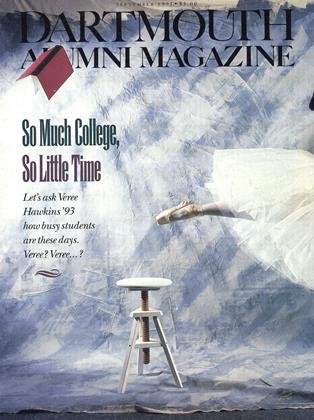• Ralf Dahrendorf, Reflections on theRevolution in Europe (Times Books, 1990)—In a long letter to a Polish friend, Dahrendorf discusses the death of socialism, the road to political and economic freedom, and Germany's role in the new Europe.
• Giinter Grass, Two States—OneNation? (Harcourt Brace Jovanovich, 1990)—Speaking out against unification and in favor of a confederation, Grass reminds his countrymen, in the midst of their euphoria over unification, of the past and of potential problems in a unified Germany.
• David Marsh, The New Germany atthe Crossroads (Century, 1990)— In his factual and pointed style, Marsh, the Bonn correspondent of the Financial Times, analyzes the economic prospects of German unification.
• Timothy Garton Ash, The MagicLantern: The Revolution of'89 Witnessedin Warsaw, Budapest, Berlin and Prague (Random House, 1990)—An insightful account of the events in Europe that led to unification.
• Fritz Stern, Dreams and Delusions:The Drama of German History (Knopf, 1987)—A distinguished historian analyses Germany's history since 1945 and its position between the dream of peace and the lure of power.
• Special Issue On German Unification, new germ an critique (Number 52, Winter 1991)—Essays on intellectual and cultural aspects of unification. Authors include Gunter Grass, Juirgen Habermas, and Andreas Huyssen.
• Robert Darnton, Berlin Journal (W.W.Norton, 1991)—A journalistic chronology from May 1989 to July 1990 as reflected in interviews with a cross-section of East German society.
• John Borneman, After The Wall:East Meets West in the New Berlin (Basic Books, 1991) —An account of the assimilation process of unification.
• John Ardagh, Germany and theGermans {Hamish Hamilton, 1987)A primer of customs and social life in Germany, both West and East. M
 View Full Issue
View Full Issue
More From This Issue
-
 Feature
FeatureAN EXAM? LET ME TRY TO PENCIL IT IN
September 1991 By JONATHAN DOUGLAS '82 -
 Feature
FeatureThe Gate keeper
September 1991 By Jim Collins '84 -
 Feature
FeatureELECTRIC BODY LANGUAGE
September 1991 By JAY HEINRICHS -
 Feature
FeatureBio Rhythms
September 1991 -
 Article
ArticleDR. WHEELOCK'S JOURNAL
September 1991 By E. Wheelock -
 Article
ArticleAFTER THE WALL
September 1991 By Professor Konrad Kenkel







